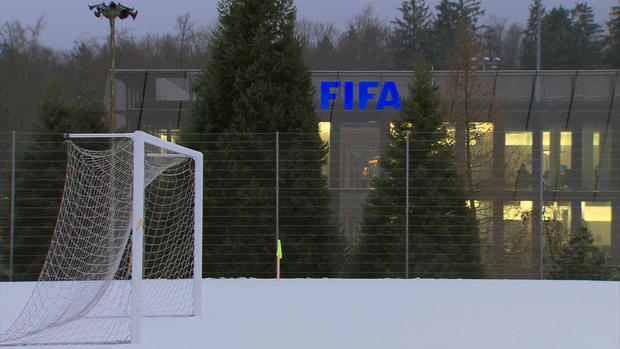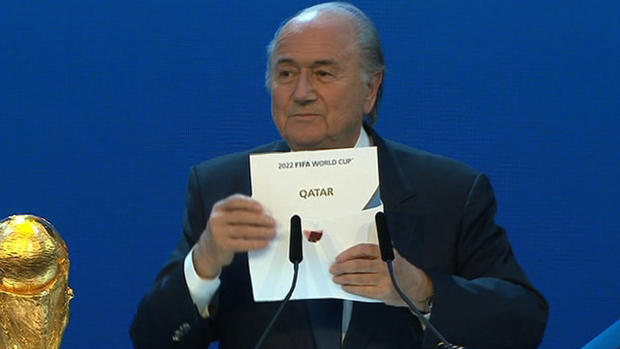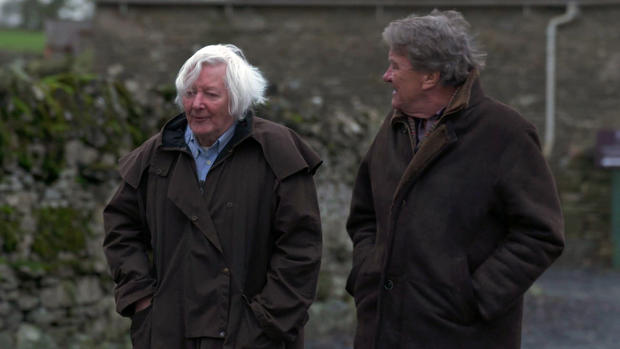Not playing by the rules? FIFA scandal unfolds
The following is a script from "FIFA" which aired on Feb. 14, 2016. Steve Kroft is the correspondent. Michael Gavshon, Maria Gavrilovic and David Levine, producers.
As everyone knows big-time sports have become big business, and most of the organizations that run them operate with little or no oversight from government or independent entities. Occasionally, issues arise like concussions in football, and doping in baseball that demand public scrutiny, but there has never been a scandal like the one enveloping FIFA -- the most powerful sporting organization in the world.
Its purpose is to regulate and promote the most popular sport in the world: international football, or soccer as we call it in the United States. But according to the U.S. Justice Department it has been operating as an organized crime syndicate for the past 24 years. And some of those alleged crimes like bribery and money laundering were planned and carried out here in the United States. Dozens of top FIFA officials past and present are under indictment and the investigation is still in its early stages.
In a few weeks, hundreds of FIFA officials from around the world will descend on Zurich for a special meeting -- one of the most important in its 112-year history, maybe even one of its last.
Its ranks have been thinned. Its president, Sepp Blatter, suspended, it's general secretary fired and five current executive committee members facing criminal charges and some nervous delegates may decide to skip the event, given what happened the last time they got together in May. Authorities swooped in and made arrests here and on three different continents -- acting at the behest of the U.S Justice Department and Attorney General Loretta Lynch.
Loretta Lynch: They were expected to uphold the rules that keep soccer honest, and protect the integrity of the game. Instead, they corrupted the business of worldwide soccer to serve their interests and to enrich themselves.
FIFA's main job is to organize and run the biggest sporting event on Earth, the World Cup, a month-long tournament of national teams that generates billions and billions of dollars and crowns a world champion every four years. It's like the Olympics -- only bigger. The honor of hosting the games can alter a nation's fortunes and the competition is intense. It's FIFA's executive committee that decides where the World Cup will be held and how the billions will be divided. According to the indictment, that's where the corruption comes in.
Steve Kroft: How did the racketeering enterprise work?
John Buretta: The allegations are that it was all about selection. Choosing where events would be held. Choosing who got the rights to broadcast. It was those key choices which were very lucrative to the recipients that created the power here.
John Buretta used to run the organized crime section of the U.S. attorney's office in the Eastern District of New York with a specialty in the Mafia.
He was used to names like Genovese and Gambino and had never heard of FIFA until the case ended up on his desk. But he knew how the game was played.
Steve Kroft: You pay me. You want this? You gotta pay me...
John Buretta: Those are definitely the allegations.
Steve Kroft: You gotta pay me $10 million in one case.
John Buretta: There were many millions in many instances alleged not just for low-level tournaments. But the World Cup itself.
Steve Kroft: So you're talking about shakedowns?
John Buretta: Absolutely.
According to the indictment that $10 million bribe was paid by the government of South Africa to help secure the 2010 Word Cup. The money, originally disguised as a charitable contribution ended up in a bank account controlled by former FIFA vice President Jack Warner, a Trinidadian who then ran the North American, Central American and Caribbean Confederation of FIFA, which was headquartered in New York. He is currently fighting extradition to the U.S.
[Jack Warner: Keep the faith, man. You gotta keep the faith. The battle has long-started.]
Warner is one of 25 FIFA officials who have been named in the indictments -- as for the bribes, well there are too many to go into here. The biggest was $150 million paid by a sports marketing firm for contracts to sell broadcasting rights.
Then, there were the smaller tips -- a stack of envelopes each filled with $40,000 in cash from an executive committee member from Qatar who was buying votes in a FIFA election.
Qatar has a very high profile at FIFA right now and it's a source of some embarrassment.
[Sepp Blatter: The 2022 FIFA World Cup is...Qatar.]
The Qataris were happy but most people thought it an odd choice...one that brought FIFA unwanted attention and made it the butt of unwanted jokes.
[John Oliver: There are now allegations that some FIFA executives took bribes to put the World Cup in Qatar, and I hope that's true. Because otherwise it makes literally no sense...]
It's not just that temperatures routinely top 120 degrees in the summer or that Qatar has a dismal human rights record, the tiny country has no soccer tradition and it would seem very few fans. Games there are often played in empty stadiums. FIFA also ignored its own internal security report which warned of a high risk for terrorism. Maybe the executive committee was impressed with this dazzling, multimedia virtual reality vision of what the Qatar World Cup would look like in 2022. Right now, this is all just a mirage.
Most people who follow international soccer aren't surprised by all this. The chicanery at FIFA has been an open secret in Europe largely because of this man, Andrew Jennings, a grizzled freelance reporter who had been harping about it for more than a decade.
Andrew Jennings: All we know is, it's the biggest scandal ever in world sport. There's nothing like it.
Steve Kroft: How did you get into this? Were you a-- were you a soccer fan?
Andrew Jennings: Definitely not. I mean, good luck to people who enjoy it, but I'm a crime reporter. I took one look at FIFA and, right, (clap) that's it. It's there. And I'd no doubts about it.
Jennings, who had broken some big stories exposing corruption at the International Olympic Committee, was asked by a sports editor to take a look at FIFA. He couldn't believe his luck.
Andrew Jennings: I did start thinking, "There's a few bad apples. Oh, goodness me, here's a few more. My goodness, (laugh) who isn't?
Steve Kroft: S-- you're-- so, bribery was just standard operating procedures at all level of FIFA?
Andrew Jennings: Well, there does come a time that you don't really get upset anymore, just another bribe. Because there's so many. In fact, it's-- it's a way of operating. It's an MO. It's how they'd run the business.
When he began asking rude questions at FIFA news conferences a dozen years ago, he was ostracized and exiled to the parking lot. For years, his colleagues in the sporting press considered him a gadfly but he turned out to be right, and eventually people started paying attention.
He landed a gig with the BBC launching kamikaze attacks on the likes of FIFA President Sepp Blatter.
[Andrew Jennings: Do you know which football officials took bribes from the ISL marketing company?
Sepp Blatter: I don't speak about that.]
And the aforementioned FIFA Vice President Jack Warner.
[Jack Warner: If I could have spit on you, I would have spat on you.
Andrew Jennings: If you could spit on me you would spit on me]
Jennings finally received his vindication in 2009 when the FBI asked for his help and invited him to London to meet with their agents.
Andrew Jennings: So I shuttled down to London and went into the room. Three-- immaculately dressed. Perfect manners. And business cards that says they did organized crime. And at that point, we were in.
Jenning gave the FBI his file on Chuck Blazer the only American on FIFA's executive committee, who lived and worked out of Trump Tower in New York.
Blazer too was a colorful character, 400 pounds of fun. He kept a pet parrot, travelled on private jets with world leaders, dined at the finest restaurants and over a seven-year period, ran up a 29-million-dollar-in-charges on his black American Express card. He documented a lot of this on his personal blog and seemed to have been having such a good time he forgot to pay his taxes which turned out to be a big mistake for Blazer and FIFA.
Michael Hershman: In my judgment, this indictment would not have happened without Chuck Blazer.
Michael Hershman has spent most of his career doing government and corporate investigations and he knows Chuck Blazer. He says when the FBI arrested him it immediately offered a deal: go to jail for tax evasion or cooperate and wear a wire.
Steve Kroft: And he chose the latter?
Michael Hershman: He chose the latter.
Steve Kroft: He had a keychain of some kind.
Michael Hershman: He had a keychain that was a microphone, as well as a keychain.
Hershman spent two years working inside FIFA after being appointed to a governance committee charged with reforming the organization in the midst of all the scandals.
Michael Hershman: I assumed that we would be able to take this organization and help turn it around but I was dissuaded from that notion fairly early on.
Steve Kroft: By whom?
Michael Hershman: Well, there was a lot of push back from the president, Sepp Blatter, and the executive committee members, many of whom were dinosaurs and didn't want to see the system change.
He says there was a culture of corruption at FIFA and its top officials weren't interested in advice from outsiders. They saw themselves as diplomats entitled to financial gratuities and expensive gifts.
Steve Kroft: They wanted tribute?
Michael Hershman: They wanted tribute. They were treated like kings, if you will.
Steve Kroft: Did you get any sense of that there was any fear or concern about p-- somebody prosecuting them?
Michael Hershman: None, whatsoever.
And with good reason...
It's no accident that the world's most powerful sports organization is headquartered here in Zurich. It's the banking capital of Switzerland, a country whose economy is based on the principles of corporate privacy, and banking secrecy.
And no one took more advantage of that than FIFA. Roland Buchel, a member of the Swiss National Legislature, says, until very recently, FIFA received about as much government scrutiny as a yodeling club.
Steve Kroft: The corruption's been no secret. People have been talking about it. And there have been allegations made for a decade or more. Why didn't the Swiss government do something?
Roland Buchel: Well, there was a problem, a problem of laws. Corruption at this time it was-- it was just not a crime. It was not a crime in this period.
Steve Kroft: You're saying it was all right to bribe people.
Roland Buchel: Of course it wasn't all right, but it was not a crime. This money was even tax deductible. The money they paid in bribes was tax deductible. That's-- that's just-- it's not-- it's not good.
Steve Kroft: And you're saying it was tax deductible? It was not only legal, it was tax deductible?
Roland Buchel: Yes.
Steve Kroft: Do you think it's tarnished the reputation of Switzerland at all?
Roland Buchel: Yes, of course. Absolutely.
Buchel has since managed to push through legislation making all forms of bribery illegal and the Swiss attorney general has finally begun his own criminal investigation into President Sepp Blatter and the Qatar World Cup.
FIFA says it's cooperating with the investigation and that it's a victim in all this...that it's a legitimate, law-abiding organization that's been used by unscrupulous individuals on the executive committee, and that justice should be allowed to run its course.
Jerome Champagne: Let's finish investigation and after that we go for trial. I have no problem with that.
Jerome Champagne, a FIFA defender, was one of Sepp Blatter's closest advisors for a decade and is running in the upcoming elections to replace him as president.
Steve Kroft: I mean, it's been said that you were his eyes and ears.
Jerome Champagne: Uh-huh (affirm).
Steve Kroft: Is that accurate?
Jerome Champagne: Sometime his mouth also.
Steve Kroft: Sometimes his mouth. Eyes, ears and mouth.
Steve Kroft: Not the nose? Did you--
Jerome Champagne: No.
Steve Kroft: --did you-- didn't sniff anything out? Mister Blatter--
Jerome Champagne: I was--
Steve Kroft: --didn't sniff anything out that anything was wrong--
Jerome Champagne: -- I tell you, I was not involved in financial aspects.
Steve Kroft: It-- if Sepp Blatter were running for reelection would you support him?
Jerome Champagne: I tell you, he would be reelected.
Steve Kroft: He would be reelected?
Jerome Champagne: Yes.
Champagne's opponents include a Jordanian prince, a sheikh from Bahrain, a wealthy South African businessman and a European soccer official. All of them are preaching reform to a FIFA membership that has long resisted it.
Steve Kroft: I mean, FIFA seems to be saying, "OK, we've got this under control. You know, we're changing. We're reforming"--
Andrew Jennings: You can't be serious--
Steve Kroft: --"and Blatter's gone"--
Andrew Jennings: You can't be serious.
Steve Kroft: No, I'm-- I'm-- I'm jus-- this is what they're saying?
Andrew Jennings: They haven't done anything. They've done nothing to reform themselves.
Steve Kroft: So, you think it's going to be business as usual?
Andrew Jennings: Well, it'll be an attempt, because they know nothing else.
For now, all the major decisions at the world's most powerful sports organization are being handled by FIFA's legal department in consultation with a big U.S. law firm and a PR outfit from Washington. All our requests for on-camera interviews were declined.



